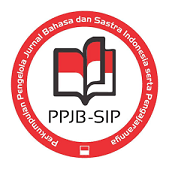Pembelajaran Mengonversi Teks Eksposisi ke dalam Bentuk Puisi Bermuatan Pendidikan Karakter di Kelas X MIPA 1 SMA Negeri 1 Singaraja
DOI:
https://doi.org/10.23887/jjpbs.v4i2.8139Abstrak
Penelitian ini menggunakan rancangan penelitian deskriptif kualitatif yang bertujuan mengetahui (1) perencanaan pembelajaran mengonversi teks eksposisi ke dalam bentuk puisi bermuatan pendidikan karakter, (2) pelaksanaan pembelajaran mengonversi teks eksposisi ke dalam bentuk puisi bermuatan pendidikan karakter, dan (3) evaluasi pembelajaran mengonversi teks eksposisi ke dalam bentuk puisi bermuatan pendidikan karakter. Subjek penelitian adalah guru Bahasa Indonesia yang mengajar kelas X MIPA 1 SMA Negeri 1 Singaraja. Objek penelitian ini adalah pembelajaran mengonversi teks eksposisi ke dalam bentuk puisi berbasis pendidikan karakter. Metode pengumpulan data yang digunakan: observasi, dokumentasi, dan wawancara. Data dianalisis melalui tiga tahapan: reduksi data, penyajian data, dan penyimpulan. Hasil penelitian ini menunjukkan (1) perencanaan pembelajaran mengonversi teks eksposisi ke dalam bentuk puisi bermuatan pendidikan karakter terlihat dari beberapa komponen dalam RPP yang telah mengandung nilai karakter, (2) pelaksanaan pembelajaran mengonversi teks eksposisi ke bentuk puisi bermuatan pendidikan karakter telah dilaksanakan oleh guru dan sesuai dengan RPP. Nilai karakter muncul dalam kegiatan awal, inti dan penutup dengan porsi berbeda, dan (3) evaluasi pembelajaran mengonversi teks eksposisi ke bentuk puisi berbasis pendidikan karakter terlihat dari adanya penilaian sikap yang menilai sikap jujur, disiplin, tanggung jawab dan santun siswa, namun dalam pelaksanaannya di kelas, evaluasi sikap tidak dilaksanakan guru secara maksimal.Kata Kunci : teks eksposisi, puisi, pendidikan karakter
This study used descriptive qualitative method which aimed at finding out (1) the learning arrangement of converting exposition text into form of poetry in character-based, (2) the learning execution of converting exposition text into form of poetry in character-based, and (3) the learning evaluation of converting exposition text into form of poetry in character-based. Subject of this study was the teacher of Bahasa Indonesia who taught the tenth grade students of MIPA program of SMA Negeri 1 Singaraja. The research object was the learning of converting exposition text into form of poetry in character-based. Data collection methods used were method of observation, documentation, and interview. Three steps were done in analyzing the data: data reduction, data display, and conclusion. The results of this study were (1) the learning arrangement of converting exposition text into form of poetry in character-based could be seen from the components of RPP that had contained character values. (2) The learning executions of converting exposition text into form of poetry in character-based had been done by the teacher and were appropriate to RPP. The character values appeared at the initial, core, and closing of activity in different portions. (3) The learning evaluation of converting exposition text into form of poetry in character-based could be seen from the assessment of attitude which assessed honesty, discipline, responsibility and politeness of students. In its implementation, the evaluation of the students’ attitude was not carried out intensely.
keyword : exposition text, poetry, character education
Diterbitkan
2016-08-01
Terbitan
Bagian
Articles
Lisensi
Authors who publish with the Jurnal Pendidikan Bahasa dan Sastra Indonesia Undiksha agree to the following terms:- Authors retain copyright and grant the journal the right of first publication with the work simultaneously licensed under a Creative Commons Attribution License (CC BY-SA 4.0) that allows others to share the work with an acknowledgment of the work's authorship and initial publication in this journal
- Authors are able to enter into separate, additional contractual arrangements for the non-exclusive distribution of the journal's published version of the work (e.g., post it to an institutional repository or publish it in a book), with an acknowledgment of its initial publication in this journal.
- Authors are permitted and encouraged to post their work online (e.g., in institutional repositories or on their website) prior to and during the submission process, as it can lead to productive exchanges, as well as earlier and greater citation of published work. (See The Effect of Open Access)







